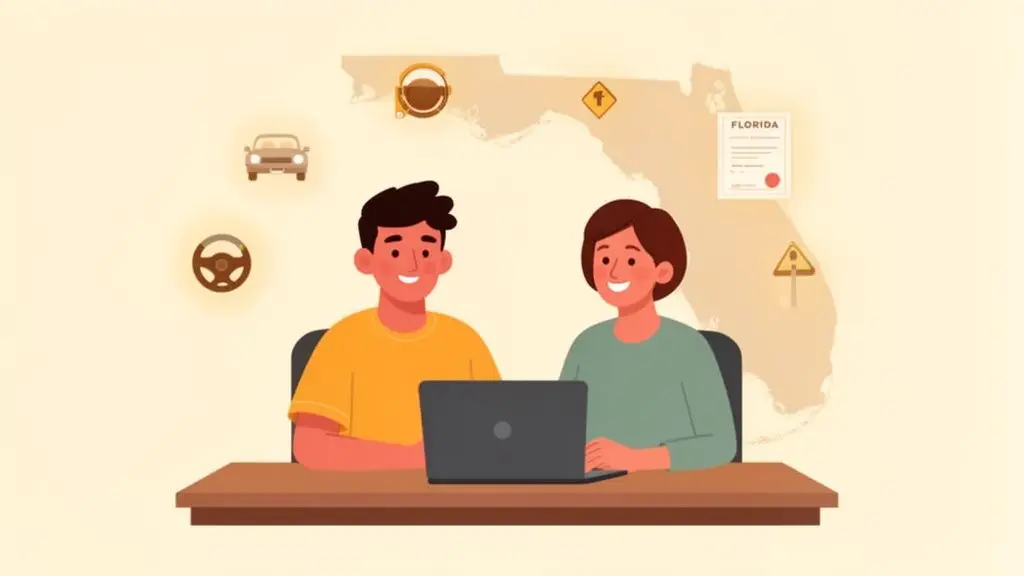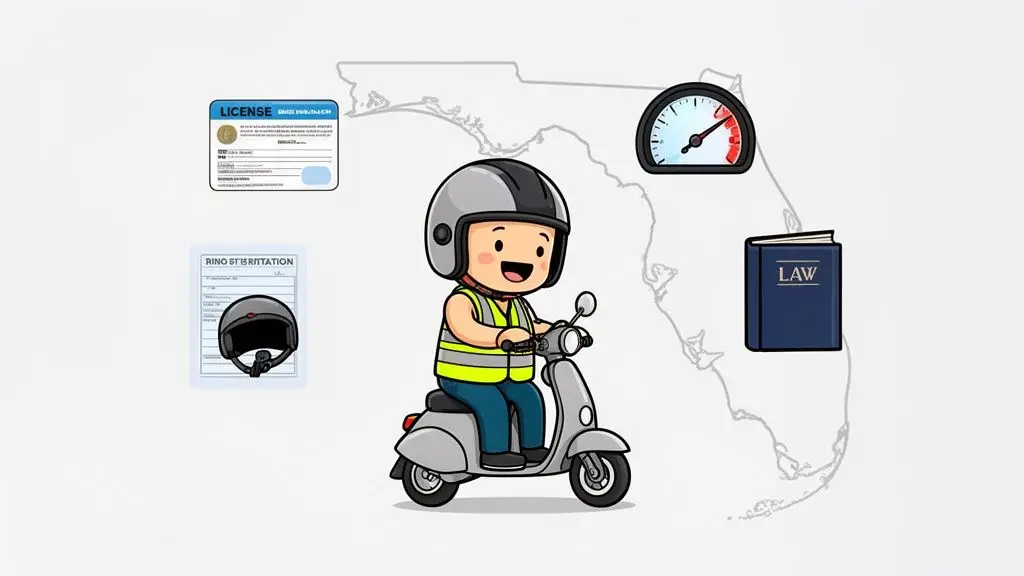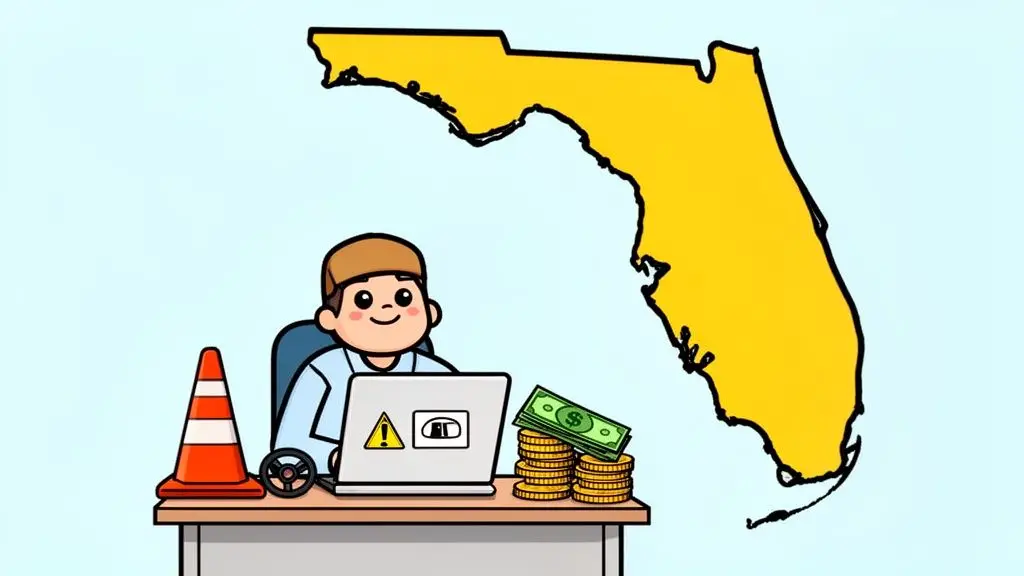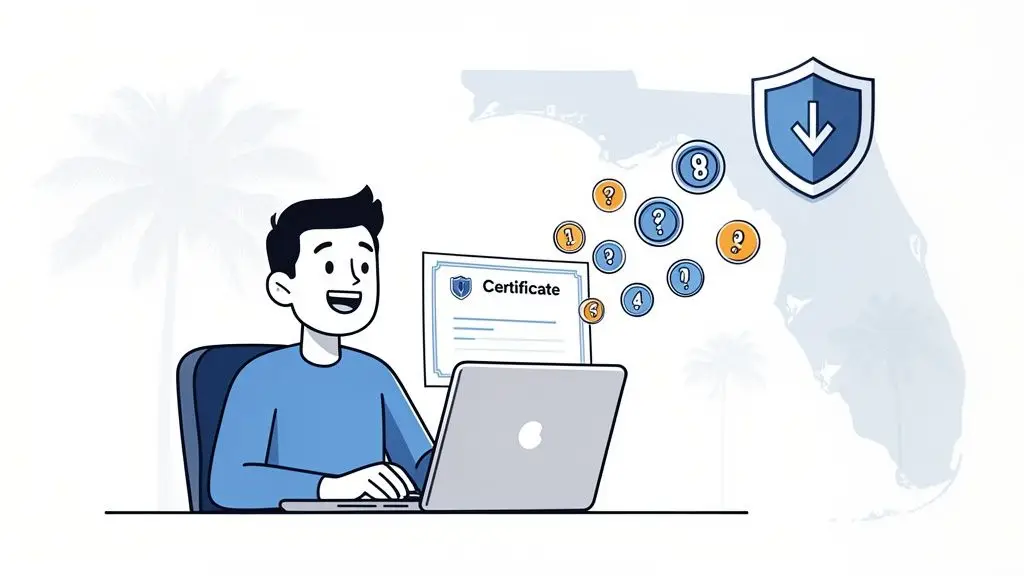That sinking feeling you get when you see a traffic ticket is often followed by a wave of confusion, especially when it mentions “points.” What exactly are they?
For the most part, points from a ticket will stick to your driving record for about two to three years, at least when it comes to the risk of license suspension. But here’s the kicker: your insurance company can often see the violation itself for much longer.
What’s the Deal with the Driver’s License Point System?
Think of your driver’s license like a scorecard for how you handle yourself on the road. The point system is simply how the state’s DMV keeps score.
It’s a straightforward system, really. When you’re ticketed for a moving violation, you get points. It’s like collecting demerits in a game you definitely don’t want to win. The goal is to keep your score as close to zero as possible.
This whole setup exists to flag drivers who might be a higher risk to everyone else. By assigning different point values to different tickets, the DMV can spot patterns and, hopefully, encourage everyone to drive a little more carefully.
How You Get Points on Your Record
Not all traffic tickets are created equal. The ones that really matter for your point total are called “moving violations”—actions that could directly endanger other people on the road. Knowing what counts is key to keeping your record clean.
Common ways to rack up points include:
- Speeding: Going faster usually means more points. A ticket for 15 mph over the limit will almost always carry more points than one for 5 mph over.
- Running a Red Light or Stop Sign: These are major safety no-nos and are a surefire way to get points.
- Reckless Driving: This is a serious offense that puts a hefty number of points on your license because of the extreme danger involved.
- Improper Passing: Weaving through traffic or making an unsafe pass is another classic point-adder.
On the other hand, non-moving violations typically won’t add points. These are infractions that, while still illegal, don’t involve the act of driving unsafely.
The key takeaway is this: moving violations add points because they reflect your skill and risk behind the wheel. Non-moving violations are usually about administrative stuff or parking.
A parking ticket, for example, is frustrating and costs you money, but it won’t add points to your license. The same goes for an expired registration sticker. The system is designed to focus on what matters most: actions that could cause a crash. Understanding this difference is the first step to managing your driving record.
State Timelines for License Points
So, how long do points actually stay on your license? It’s one of the first questions people ask after getting a ticket, but the answer isn’t a simple one. The truth is, it depends entirely on where you live, creating a real patchwork of rules across the country.
Each state sets its own clock for how long points count against you for suspension purposes. As a general rule of thumb, you can expect points to stick around for anywhere from one to three years. But for major violations like a DUI or reckless driving, those points—and the conviction itself—can haunt your record for much, much longer. Sometimes for a decade, or even for good.
It’s also crucial to understand the difference between how the DMV sees points and how your insurance company does. Points might “fall off” your record for suspension calculations after a couple of years, but the violation that caused them often stays visible to insurers for three to five years. That means you could still be paying higher premiums long after the DMV has stopped counting the points.
The infographic below gives a quick visual on how different types of violations fit into a point system.
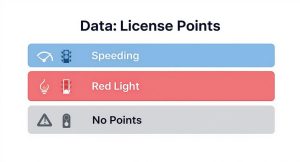
As you can see, it’s the moving violations like speeding that add points, while non-moving stuff like parking tickets usually won’t.
A Look at Different State Timelines
The difference in how long points last from one state to the next can be pretty dramatic. To give you a better idea, here’s a quick look at a few examples.
Driver’s License Point Duration in Select States
This table provides a general overview of how long points for common traffic violations typically remain on a driver’s record for suspension purposes in various states.
| State | Typical Point Duration (Years) | Notes |
|---|---|---|
| Georgia | 2 | Points stay on your record for 24 months from the date of conviction. |
| Ohio | 2 | Points from a standard moving violation expire after two years. |
| California | 3.25 | Most points last for 39 months. |
| Florida | 3 | Points from a violation like speeding expire after 36 months. |
| New York | 1.5 | Points are counted for 18 months from the date of the violation. |
As the table shows, there’s no national standard. A state like California keeps most points on your record for 39 months, and major offenses like a DUI can last for a full 10 years. This is why knowing your local rules is so important. Racking up points too quickly can have serious consequences, and it’s smart to know how many points it takes to suspend a license where you live.
One of the biggest misconceptions is that when points expire, the violation vanishes. In reality, the ticket itself usually stays on your permanent driving record, even if the points no longer count toward a suspension.
This isn’t just a U.S. thing, either. In Europe, point retention periods can range from 2.5 to 10 years, depending on how serious the offense was. The Netherlands, for example, has a system where points stay on a driver’s record for five or seven years.
How Violation Severity Impacts Duration
Not all points are created equal, and their lifespan almost always reflects the seriousness of what you did. A minor speeding ticket might add a couple of points that are gone in a few years, while more dangerous driving carries a much heavier, longer-lasting penalty.
Think of it like this:
- Minor Violations: A ticket for going 10 mph over the speed limit is a low-point offense. These points usually have the shortest shelf life.
- Serious Violations: Things like reckless driving or running from the police will add a big chunk of points that stay active for a much longer time.
- Major Offenses: A conviction for something like a DUI or vehicular homicide often results in points that can remain on your record for many years, sometimes permanently scarring your driving history.
At the end of the day, the goal of these different timelines is to penalize dangerous driving more severely. States want to track patterns of high-risk behavior, and the point system’s duration is one of the key tools they use to do it.
A Closer Look: The Florida Point System in Action
To really get a feel for how these systems work, let’s zoom in on one state. Florida is a perfect real-world example of how quickly points can pile up and the serious trouble that follows. Their approach shows why you absolutely have to know your local rules—the road to a suspended license is a lot shorter than most people think.
In Florida, the punishment is designed to fit the crime. A simple speeding ticket for going less than 15 mph over the limit will land you 3 points. But if you do something more serious, like driving recklessly or causing an accident, you’re looking at 4 points.
Those numbers might not sound like a big deal on their own, but they add up fast. Knowing what each ticket is “worth” in points is the first step to keeping your license safe. For a full breakdown, check out our detailed guide to the Florida traffic ticket point system.
Florida’s Suspension Thresholds
Here’s where it gets tricky. Florida doesn’t just look at your total points; it tracks them on a rolling clock. This catches a lot of drivers off guard. The system is built to spot patterns of risky behavior over specific timeframes.
The state’s rules for suspension are strict and leave no room for error:
- Rack up 12 points within any 12-month period, and you’ll face a 30-day suspension.
- Get 18 points within an 18-month period, and that suspension jumps to 3 months.
- If you accumulate 24 points over a 36-month period, you’re losing your license for a full 1-year.
It’s easy to see how a few mistakes in a short amount of time can cost you your driving privileges. For instance, just three 4-point tickets inside of a year is all it takes to trigger that first 30-day suspension.
Florida’s point system isn’t just about punishment; it’s a time-sensitive formula. The clock is always ticking, and the DMV is watching not just what you did, but when you did it.
How Long Do Points Haunt Your Florida License?
So, how long do you have to worry about these points? For the DMV’s suspension purposes, points from a ticket count against you for 36 months (that’s three years) from the day you were convicted. After that, they “expire” and no longer contribute to a potential suspension.
But here’s the critical part most people miss: the violation itself never truly disappears from your record. Insurance companies can see that ticket on your complete driving history long after its points have expired for the DMV. A speeding ticket from four years ago might not risk your license anymore, but you can bet it’s still playing a role in what you pay for car insurance.
The True Cost of Points on Your Car Insurance
Beyond the risk of losing your license, points on your driving record hit you right where it hurts: your wallet. The DMV is concerned with public safety, but your insurance company is looking at something else entirely. For them, every point is a bright red flag, a statistical indicator that you’re more likely to cost them money with a future claim.
This is the bedrock of how car insurance is priced. Insurers use your driving history as their crystal ball, predicting how you’ll behave on the road tomorrow based on how you drove yesterday. When new points pop up on your record, their calculations shift, and your premium almost always goes up to match that new, higher risk.

Even one minor ticket can be enough to trigger a rate increase. Rack up a few violations, and you might find yourself branded a “high-risk” driver. That’s a label that comes with painfully high premiums—or worse, your insurer could decide to drop you altogether.
Understanding Insurance Surcharges
When your insurance rate goes up after a ticket, that extra cost is officially called a surcharge. It’s a penalty tacked onto your premium for a specific length of time, and this is where things get tricky.
While the DMV might only count points toward a suspension for a couple of years, insurance companies have much longer memories. A surcharge for a single violation typically sticks around for three to five years. That means you’ll be paying for that mistake long after the points have “expired” in the eyes of the DMV.
Here’s the key thing to remember: Just because points are too old to count toward a license suspension doesn’t mean they’ve disappeared. Your insurance company still sees that violation and will use it to calculate your rates for years.
This long-lasting financial penalty really drives home the importance of understanding how points affect your insurance. A momentary lapse in judgment can have financial consequences that follow you for half a decade, which is why a clean driving record is your best tool for keeping insurance costs low.
The Financial Impact of Different Violations
The size of that surcharge is directly linked to how serious the offense was. Insurers have their own internal point systems, and they weigh violations based on the level of risk each one represents. A minor speeding ticket will nudge your rates up, but a more serious offense can send them skyrocketing.
Here’s a rough idea of how different tickets can hit your premium:
- Minor Violations: Getting caught going 1-15 mph over the speed limit might result in a noticeable but manageable increase.
- Serious Violations: Things like reckless driving or a major speeding ticket (30+ mph over the limit) can cause a major spike in what you pay.
- Major Offenses: A DUI conviction is the worst-case scenario. It can easily cause your premium to double or even triple, and that surcharge can last for many, many years.
At the end of the day, keeping points off your license isn’t just about holding onto your driving privileges—it’s about protecting your budget. The financial fallout from a bad driving record can easily add up to thousands of dollars over time, making a proactive choice like taking traffic school a very smart investment.
How to Check Your Driving Record for Points
Are you wondering how many points are actually on your license? Don’t guess. When your driving privileges are at stake, you need to know for sure.
Thankfully, checking your status is a pretty straightforward process. The most reliable way to get the real story is by going straight to the source: your state’s Department of Motor Vehicles (DMV) or whatever agency handles licensing in your area.
Most DMVs have online portals where you can request an official copy of your driving record, sometimes called a Motor Vehicle Record (MVR). This report gives you the complete picture—every violation, every point, and your current total.
Your Options for Getting Your Record
While grabbing your record online is usually the fastest route, it’s not your only choice. You generally have three main ways to get this crucial information.
- Online Request: This is the quickest option by far. You can often get a digital copy of your record in just a few minutes.
- Mail-In Request: If you prefer a paper copy or aren’t in a hurry, this is a solid, old-school method. Just download the form from your DMV’s website and send it in.
- In-Person Visit: Need an official, certified copy right away for a job or a court appearance? Heading down to a local DMV office is your best bet.
To make things go smoothly, have your info ready. You’ll almost always need your driver’s license number, date of birth, and the last four digits of your Social Security number.
A quick heads-up: DMVs often provide a few different types of records. An unofficial copy is usually perfect for your own review, but you’ll likely need a certified copy for anything official.
Using Third-Party Services
Besides going directly through the DMV, you’ll find plenty of reputable third-party companies that can pull your driving record for you. These services can be incredibly convenient, but be prepared to pay a bit more than you would at the DMV. They’re great for a quick, informational check-up, but remember that courts and employers will almost always require a state-issued document.
For a more detailed breakdown of all these methods, our guide on how to check your driving record has you covered.
No matter how you do it, checking your record periodically is just plain smart. It lets you know exactly where you stand, confirm that old points have dropped off as they should, and spot any potential errors before they turn into a real headache.
What Can You Do About Points On Your License?

Finding out you’ve got points stacking up on your license can feel like you’re backed into a corner. But it’s not a lost cause—you actually have more control over the situation than you might realize. Instead of just waiting for the bad news to arrive in the mail, you can take some concrete steps to protect your driving privileges.
The best defense is a good offense. Rather than just worrying about how long points stay on your license, the smarter move is to prevent them from ever being added. This means acting fast right after you get a ticket.
Take a State-Approved Driving Course
One of the most effective tools in your toolbox is a state-approved defensive driving or traffic school course. Many states offer this as a get-out-of-jail-free card for a minor moving violation. Think of it as a mulligan—a chance to erase one mistake from your record.
A great example is Florida’s Basic Driver Improvement (BDI) course. If you get a non-criminal moving violation that’s eligible, you can choose to take this course. Once you pass, the state agrees to “withhold adjudication,” which is just a fancy way of saying no points are added to your license for that ticket.
Taking a BDI course is a strategic move. It keeps your driving record cleaner and, just as importantly, helps you dodge the auto insurance rate hikes that almost always come with a conviction.
Other Ways to Handle Points
Besides traffic school, there are a few other paths you can take. The right one for you really depends on the specifics of your situation.
- Contest the Ticket: If you’re convinced the ticket was issued unfairly, you have every right to fight it in court. This can be a tough road, and winning often comes down to the evidence and exactly what happened during the traffic stop.
- Wait It Out: Sometimes, the simplest solution is the best one. If you only have a couple of points and you’re nowhere near your state’s suspension threshold, just focus on driving safely and let the points fall off your record on their own.
- Get a Lawyer: For serious violations, it’s wise to bring in a professional. An attorney can provide strategies to keep your license after a DWI and work to minimize the long-term damage to your driving record.
Ultimately, these point systems are designed to make our roads safer, and they do work. A study of Spain’s system, which started in 2006, found a major drop in crashes and fatalities right after it was introduced. But the positive impact began to fade after about seven years, showing that it’s up to us as drivers to stay vigilant and actively manage our records for long-term safety.
Common Questions About License Points, Answered
Let’s clear the air on some of the most common questions drivers have about the point system. Getting a straight answer can be tough, so we’ll break down what you really need to know.
Do Points From an Out-of-State Ticket Follow Me Home?
Unfortunately, yes, they usually do. Most states participate in an agreement called the Driver License Compact (DLC), which is just a formal way of saying they talk to each other about traffic tickets.
When you get a ticket in another member state, they’ll report it back to your home DMV. From there, your state will typically add points to your license according to its own rules. Trying to ignore an out-of-state ticket is a bad idea—it almost always catches up with you and can cause much bigger headaches.
Can I Take a Driving Course to Wipe Away Old Points?
This is a big one, and the answer is: it depends on your state. For many states, a traffic school course is a preventive measure. You take it after getting a ticket to stop the points from ever hitting your record in the first place. It doesn’t act like an eraser for points that are already there.
A few states are different. Georgia, for example, lets you complete a course to shave off up to 7 points from your record once every five years. The key is to check the specific rules on your state’s DMV website before you assume anything.
Think of a traffic course as a way to avoid points for a fresh ticket, not a tool to erase old mistakes. That’s why acting fast after you get a violation is so important.
How Many Points Until My License Is Suspended?
There’s no single magic number; it varies wildly from state to state. In a stricter state like California, racking up just 4 points in 12 months could get your license suspended. Meanwhile, in Florida, you have a bit more runway with a threshold of 12 points over the same period.
The type of violation matters, too. A handful of minor tickets might not trigger a suspension, but one serious offense could. You absolutely have to look up the suspension rules for your specific state to know where the line is.
Do I Have to Call My Insurance Company and Confess I Got Points?
You don’t have to pick up the phone and tell them, but trust me, they’ll find out. Insurance companies aren’t just sitting around; they pull your Motor Vehicle Record (MVR) on a regular basis, almost always before your policy renewal.
When they see new violations and points on your record, they’ll re-evaluate how risky you are to insure. More often than not, this leads to a not-so-pleasant surprise: a higher premium.
Don’t let a simple traffic ticket mess with your driving record and your insurance rates. Here at BDISchool, our state-approved online Basic Driver Improvement course is the most straightforward way to keep points off your Florida license for an eligible ticket. Take control of the situation and keep your rates down by enrolling in our BDI course today.
